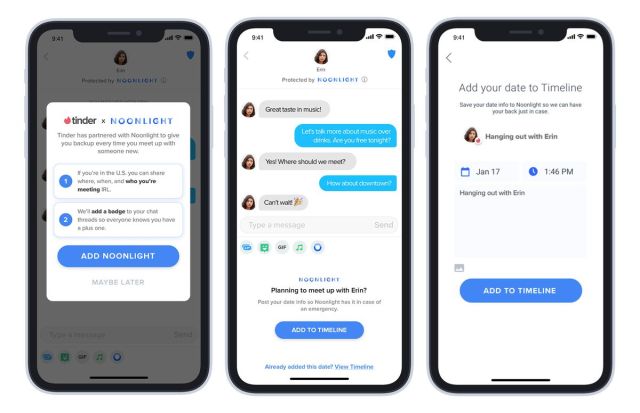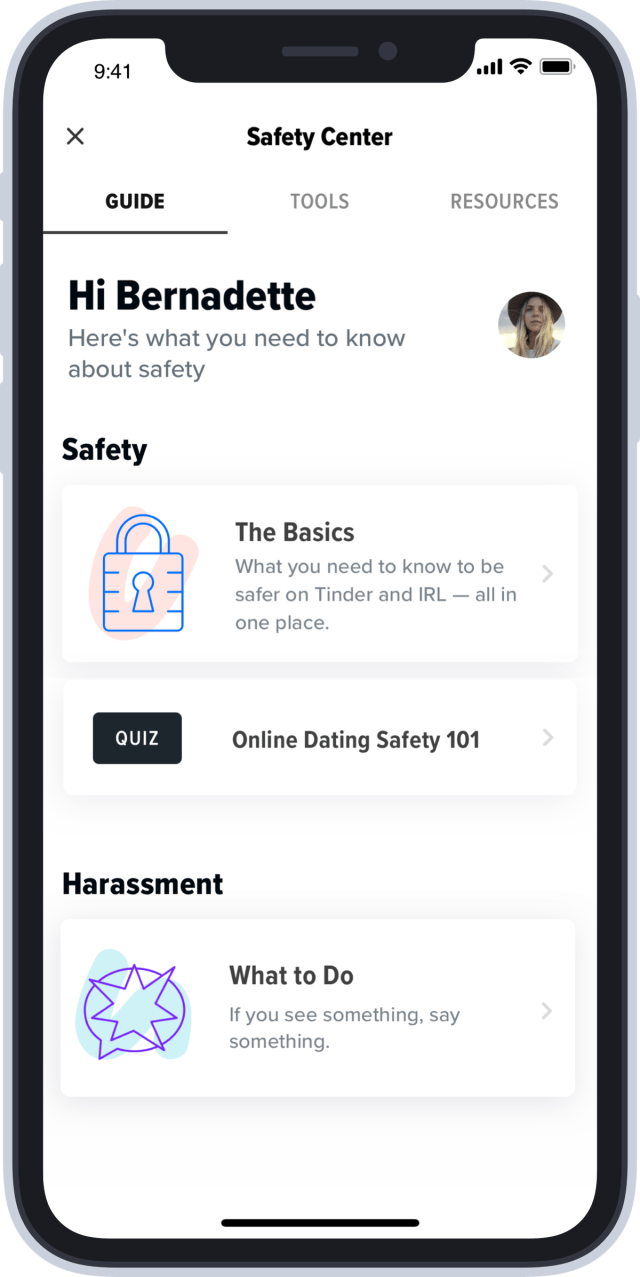Tinder will give you a verified blue check mark if you pass its catfishing test
Tinder is launching new safety features today, including a photo verification system that’ll place a blue check mark on daters’ profiles, a partnership with the safety app Noonlight to give daters an easy way to call emergency services, and a feature that flags potentially offensive messages.
The photo verification system requires daters to take a selfie in real time that matches a pose shown by a model in a sample image. Those photos are then sent to Tinder’s community team, which verifies that each user matches both the given pose and their chosen profile photos. If everything lines up, they’ll receive a blue check mark, which is meant to give their potential matches peace of mind that they won’t be catfished.
For now, humans will be checking the photos and verifying that people are who they say they are, but the goal is to eventually offload that task to software. It’s unclear when that’ll happen, if ever. Tinder has millions of users around the world, so it’s rolling this feature out slowly for now and in smaller areas, like Taiwan and Ireland. Bumble introduced a similar system for its users in 2016.
It’s unclear how well this system will keep people from being surprised at who shows up to their date, even with human verifiers. People cut and grow their hair, gain and lose weight, and age, meaning the profile photos used to verify themselves will eventually be outdated. Tinder hasn’t said how long a verification badge is good for and if it’ll ever expire. It also hasn’t said whether people will have to redo the process every time they want to update their pictures. Right now, daters sometimes note in their profiles whether they’ve updated their look, like if they’ve grown a mustache or dyed their hair, so maybe that’ll remain the best option for staying verified while also accurately setting matches’ expectations.
Apart from the selfie verification process, the company also says it’s slowly rolling out a feature in “select markets” that detects potentially offensive messages and asks daters whether a message “bothered” them. If it did, they can report the person. The company says this feature will eventually lead to another called “undo” that’ll give people the option to unsend a potentially offensive message. The feature sounds similar to one launched by Instagram in 2017 that detects offensive comments, although in that case, Instagram gives users the power to automatically hide the comments.
 Tinder
Tinder Tinder is also announcing a partnership with safety app Noonlight to give US-based users free access to the app, as well as a new “safety center” where people can find resources and tools about dating online. Noonlight syncs with various apps and devices, including Tinder, to provide on-call emergency service assistance.
Daters who sync their Tinder account with Noonlight can choose to display a badge on their profile saying they did so, which is meant to function as a kind of warning that they’re protected. People can tell Tinder and Noonlight when they’re going on a date and with whom, and if there’s an emergency during the date, they can take out the Noonlight app and hold down a button to summon emergency services. Noonlight will ask for a PIN to cancel that request at first. It’ll also text and then call. If no action is taken, emergency services will be called. Uber built a similar emergency calling feature into its app in 2018, as well as a safety center.
Generally, it seems like Tinder has picked up on other apps’ efforts to keep users safe and is doing so in turn. It’s playing a bit of catch up. Still, the offensive comment feature and emergency calling could have wide-reaching effects that might not only change the culture of chatting on the app for the better, but also give daters more peace of mind that they have a way out of a dangerous situation if necessary.
 Image: Tinder
Image: Tinder Tinder is launching new safety features today, including a photo verification system that’ll place a blue check mark on daters’ profiles, a partnership with the safety app Noonlight to give daters an easy way to call emergency services, and a feature that flags potentially offensive messages. The photo verification system…
Recent Posts
- An obscure French startup just launched the cheapest true 5K monitor in the world right now and I can’t wait to test it
- Google Meet’s AI transcripts will automatically create action items for you
- No, it’s not an April fool, Intel debuts open source AI offering that gauges a text’s politeness level
- It’s clearly time: all the news about the transparent tech renaissance
- Windows 11 24H2 hasn’t raised the bar for the operating system’s CPU requirements, Microsoft clarifies
Archives
- February 2025
- January 2025
- December 2024
- November 2024
- October 2024
- September 2024
- August 2024
- July 2024
- June 2024
- May 2024
- April 2024
- March 2024
- February 2024
- January 2024
- December 2023
- November 2023
- October 2023
- September 2023
- August 2023
- July 2023
- June 2023
- May 2023
- April 2023
- March 2023
- February 2023
- January 2023
- December 2022
- November 2022
- October 2022
- September 2022
- August 2022
- July 2022
- June 2022
- May 2022
- April 2022
- March 2022
- February 2022
- January 2022
- December 2021
- November 2021
- October 2021
- September 2021
- August 2021
- July 2021
- June 2021
- May 2021
- April 2021
- March 2021
- February 2021
- January 2021
- December 2020
- November 2020
- October 2020
- September 2020
- August 2020
- July 2020
- June 2020
- May 2020
- April 2020
- March 2020
- February 2020
- January 2020
- December 2019
- November 2019
- September 2018
- October 2017
- December 2011
- August 2010